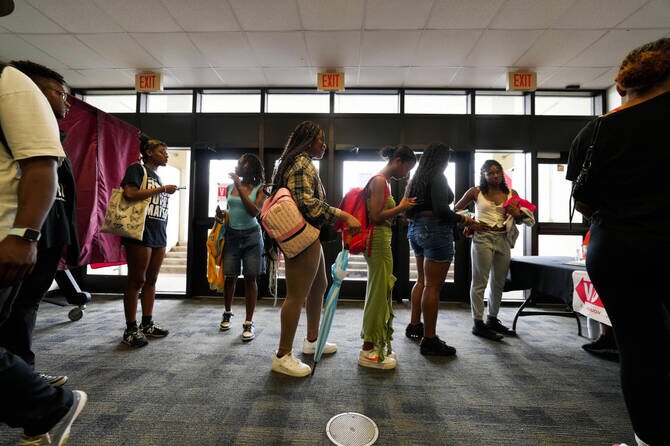
US Supreme Court to Hear Pivotal Minority Voting Rights Case
The US Supreme Court is set to hear a case involving Black voters that could significantly impact party control in the House of Representatives.
The US Supreme Court will examine a case concerning minority voting rights on Wednesday, a decision that may have lasting implications for the balance of power in Congress.
The contentious case revolves around the creation of a second Black majority district in Louisiana's congressional map, which has been challenged on grounds of race and politics.
Initially heard by the court last term, the case was remanded for re-argument during this current session due to its significant legal ramifications.
African-Americans, who constitute one-third of Louisiana's population, traditionally lean heavily towards Democratic candidates.
Following the 2020 census, Louisiana redrew its congressional map, reducing the number of Black majority districts from two to one.
This change has sparked a lawsuit by the American Civil Liberties Union (ACLU) and others, alleging that it diminishes the voting power of Black citizens and violates the Voting Rights Act of 1965.
In response to this legal challenge, the Louisiana legislature proposed a new map reinstating two Black majority districts.
However, opponents, who are not African-American, argue that using race as a factor in redistricting constitutes an unconstitutional form of gerrymandering under the 14th Amendment's equal protection clause.
The stakes are high, with the outcome expected to influence not only Louisiana's congressional map but also future redistricting cases nationwide.
The balance of power in Congress hangs precariously in the balance.
Republicans currently hold a narrow majority in the House, and adjustments to the number of minority districts could sway the control of the chamber in the 2026 midterm elections.
If the Supreme Court rules against protections under the Voting Rights Act, it is estimated that Republicans might gain as many as 19 additional seats.
This case is being reviewed amid a broader context of redistricting efforts across both Republican and Democratic-led states.
Texas, for example, is implementing new congressional district maps expected to shift up to five seats from Democrats to Republicans, primarily by fragmenting districts that supported Democratic candidate Joe Biden over Donald Trump in the 2024 election.
In response, California's Democratic leaders have proposed redistricting measures to counter potential Republican gains in Texas, pending a statewide referendum.
This legal battle encapsulates the complex interplay between race, politics, and representation, with its resolution potentially reshaping the political landscape of the United States.
The contentious case revolves around the creation of a second Black majority district in Louisiana's congressional map, which has been challenged on grounds of race and politics.
Initially heard by the court last term, the case was remanded for re-argument during this current session due to its significant legal ramifications.
African-Americans, who constitute one-third of Louisiana's population, traditionally lean heavily towards Democratic candidates.
Following the 2020 census, Louisiana redrew its congressional map, reducing the number of Black majority districts from two to one.
This change has sparked a lawsuit by the American Civil Liberties Union (ACLU) and others, alleging that it diminishes the voting power of Black citizens and violates the Voting Rights Act of 1965.
In response to this legal challenge, the Louisiana legislature proposed a new map reinstating two Black majority districts.
However, opponents, who are not African-American, argue that using race as a factor in redistricting constitutes an unconstitutional form of gerrymandering under the 14th Amendment's equal protection clause.
The stakes are high, with the outcome expected to influence not only Louisiana's congressional map but also future redistricting cases nationwide.
The balance of power in Congress hangs precariously in the balance.
Republicans currently hold a narrow majority in the House, and adjustments to the number of minority districts could sway the control of the chamber in the 2026 midterm elections.
If the Supreme Court rules against protections under the Voting Rights Act, it is estimated that Republicans might gain as many as 19 additional seats.
This case is being reviewed amid a broader context of redistricting efforts across both Republican and Democratic-led states.
Texas, for example, is implementing new congressional district maps expected to shift up to five seats from Democrats to Republicans, primarily by fragmenting districts that supported Democratic candidate Joe Biden over Donald Trump in the 2024 election.
In response, California's Democratic leaders have proposed redistricting measures to counter potential Republican gains in Texas, pending a statewide referendum.
This legal battle encapsulates the complex interplay between race, politics, and representation, with its resolution potentially reshaping the political landscape of the United States.










